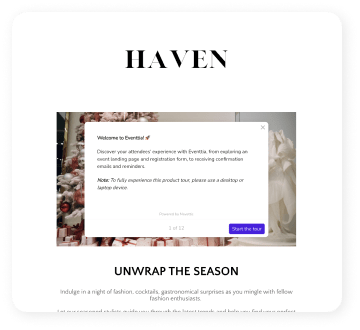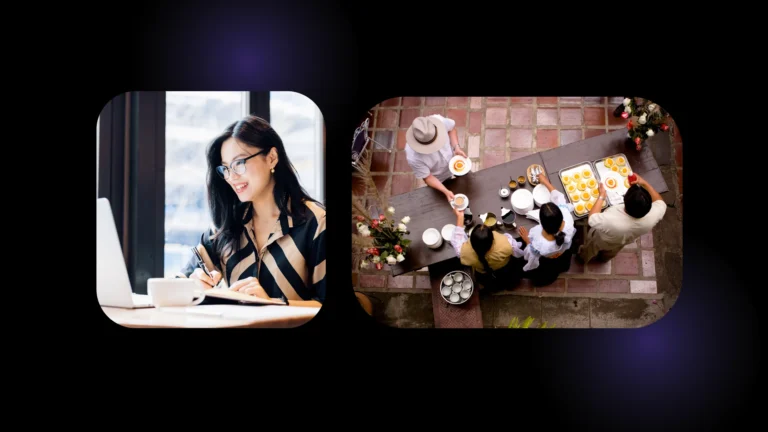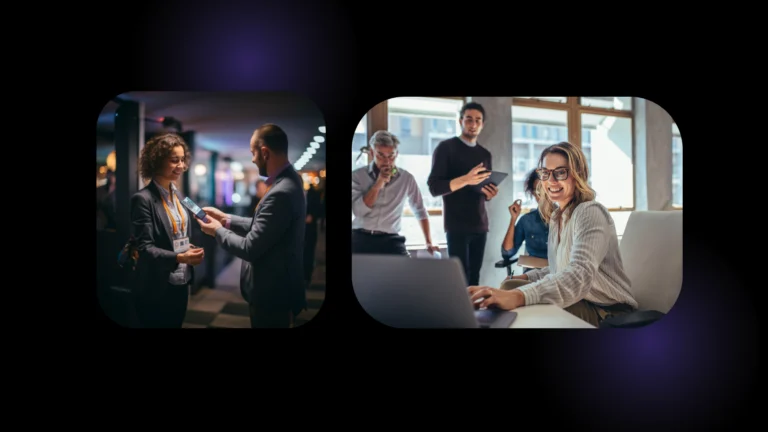For the best part of 3 decades, marketers across all types of business have been using webinars for a long list of reasons. So by now, it’s fair to say we should all be familiar with what they can offer. But suddenly, this has become a lot more blurred and that’s all thanks to the virtual event platforms.
A webinar is a virtual event in its own right, but with the development of technology virtual events now cover a lot more than just a presentation-style digital conference. What we’re now seeing is a physical event being replicated online, meaning multiple sessions with multiple elements such as networking rooms, virtual booths, and information desks.
But despite all of this, the webinar is such a staple to marketers that it will always have a place in its own right. What makes it complicated is that we’re seeing webinars appear in almost every virtual event out there. This often makes it hard to distinguish between a webinar and a virtual event. So, to put this one to bed, we’re going to outline the major differences between the two.
First things first, here are the definitions:
Webinars: Short for web-based seminar, a webinar is a collaborative and interactive way for you to connect with your attendees in an intimate setting that emphasises learning. The normal procedure is for a host to be joined by one or more presenters to discuss a topic for a set amount of time, usually around the hour mark. To hold a webinar, you need to have a stable internet connection and use a reliable web browser that supports the necessary webinar platform features, including video streaming, screen sharing, and interactive engagement tools. Doing a quick Firefox vs Brave comparison can help you choose the browser that best suits your specific webinar needs.
Beyond the basic principles, webinar platforms will also offer many visual elements including live streams of the presenter talking, slide sharing, whiteboards, surveys, and live chat. The presentation is usually followed by a Q&A session where the audience can ask questions.
Virtual events: A fully encompassing virtual event goes beyond providing just one component. Instead, it offers multiple components and sessions over a much longer time frame (just like an in-person event)
This can be anything from tutorials and networking to product launches and conferences. Every event will have its own identity, what’s important is that you identify which components are going to you the maximum engagement.
So, we’ve got a good understanding of what a webinar and a virtual event is, now it’s time to dive into the main differences that exist between the two.
Webinars aren’t events as we know them
OK, this can get a bit confusing but let us explain. A webinar is a virtual event because it involves people interacting in a virtual environment online. But they’re not your typical sort of event that we’ve all come to be so familiar with for example trade shows, product launches, networking sessions and so on.
These events are multi-dimensional, and whilst they will most likely involve plenty of webinars, their scope goes beyond that. The scope of a webinar is much narrower than that of a virtual event, and that’s why marketers use them for more specific purposes from product training to classes.
Webinars have a much narrower scope
Yes, the size of a webinar can be in the 100s but when we compare this to a virtual event there is a big difference. Because the latter has a much bigger bandwidth, and with that comes a bigger audience. Virtual event attendees are going to be attending the event for multiple reasons compared to webinar attendees who have one specific need in mind.
Whether that’s for networking or virtual booths, the diversity that comes with virtual events opens it up to a lot more attendees.
It’s harder to express your narrative with a webinar
The different elements of virtual events make it a lot easier to express your narrative both for the brand and the event itself. Compared to a webinar which is just going to be a presentation with a speaker and some interaction from whiteboards and surveys, virtual events allow you to go further.
The different components of a virtual event provide a lot more opportunities to portray yourself and in turn, your attendees will get a full brand experience of everything that you have to offer.
Webinars give attendees less freedom
When it comes to virtual events, attendees can pick and choose what content they want to experience. Maybe they’re there for the networking, or maybe they’re there for the exhibitor booths. Whilst webinars are always popular, there are plenty of other reasons why attendees want to attend events.
For marketers that means greater engagement, and for attendees that means the freedom to attend what interests them the most. It’s also worth noting that, a lot of virtual events offer webinars recordings on-demand during and after the event.
Webinars don’t have the same amount of engagement
Ensuring that your attendees are always engaged is a lot tougher when it comes to virtual events. That’s why it’s about giving them different options. What we see with webinars is that their rigid structure is often a deterrent for attendee engagement. Options are limited and with this, it becomes much harder for attendees to interact and communicate.
Now compare this to a virtual event, which offers live questions, concepts, and experiences, you can see how and why it’s a lot easier for attendees to immerse themselves in the event.
Key Takeaways
Webinars are excellent as a marketing or information delivery tool but they aren’t events in the classic sense of what we know an event to be. Whereas virtual events offer a lot more flexibility and with that comes more opportunity to engage with your attendees and provide them with a better experience. Ultimately, it all boils down to your needs and your marketing objectives.






